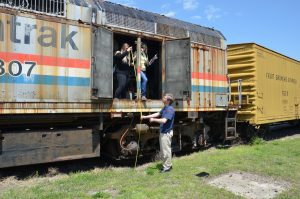EPIC’s Transportation Energy Cluster Researchers Usher in New Chapter of Rail History

A new chapter of passenger locomotive propulsion opened at the N.C. Transportation Museum this past April. Researchers from UNC Charlotte’s Lee College of Engineering met with industry experts and museum staff to discuss an innovative battery-powered engine.
It will be the “Prius of Locomotives”. Those are the words of Ian Stewart of Rail Propulsion Systems (RPS) as he described the train that researchers from the College’s EPIC Transportation Energy Research Cluster are helping develop. RPS, in partnership with McDowell Engineering & Associates (MEA), wish to develop a cutting-edge battery-powered hybrid train — in other words, a “green” locomotive. A group of graduate students led by Drs. Shen-En Chen and Nicole Braxtan met with RPS and MEA at the North Carolina Transportation Museum (NCTM) in Spencer, NC on April 13.
RPS and MEA have a successful track record with locomotive emission reduction efforts on diesel-electric engines owned by the N.C. Department of Transportation Rail Division and used for the Piedmont passenger service between Raleigh and Charlotte. The engine used for this NCTM project will be the F40PH, retired by Amtrak in the early 1990s. The end product will be an engine which can produce close to 8,000 HP, that’s almost 5,000 more horse power than the traditional engine, with nearly no harmful emissions. This zero emissions booster locomotive (ZEBL) will be ideal for future application to the commuter and light rail systems used within and between metro areas like Raleigh and Charlotte.
The meeting at the NCTM was the first of many on-site planning meetings with UNC Charlotte. The first of its kind in the U.S., this pilot project will be a multi-disciplinary effort in conjunction with the Electrical and Computer Engineering and Mechanical Engineering Departments at UNC Charlotte. NCTM features vintage planes and automobiles, in addition to an abundance of vintage locomotives. The NCTM’s significance in the railroad history of North Carolina and the Southeastern US make it a fitting place to connect transportation history with the future of green locomotive propulsion.